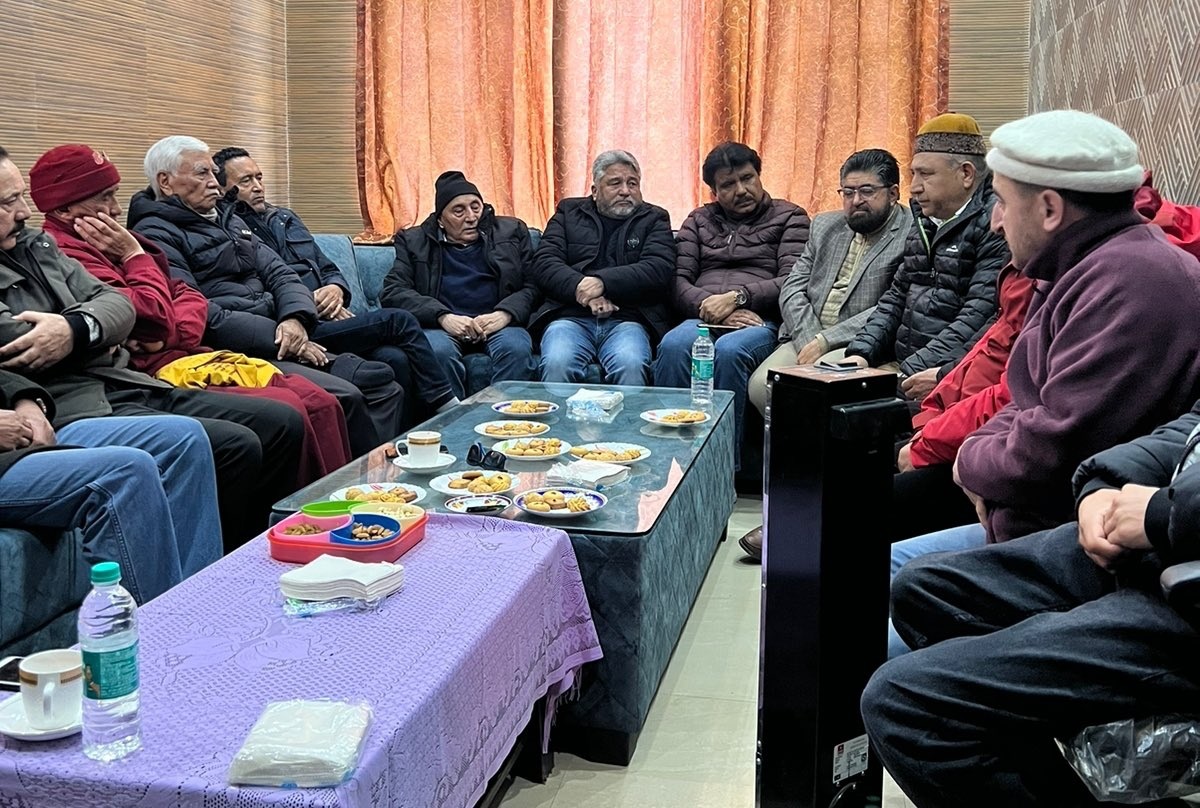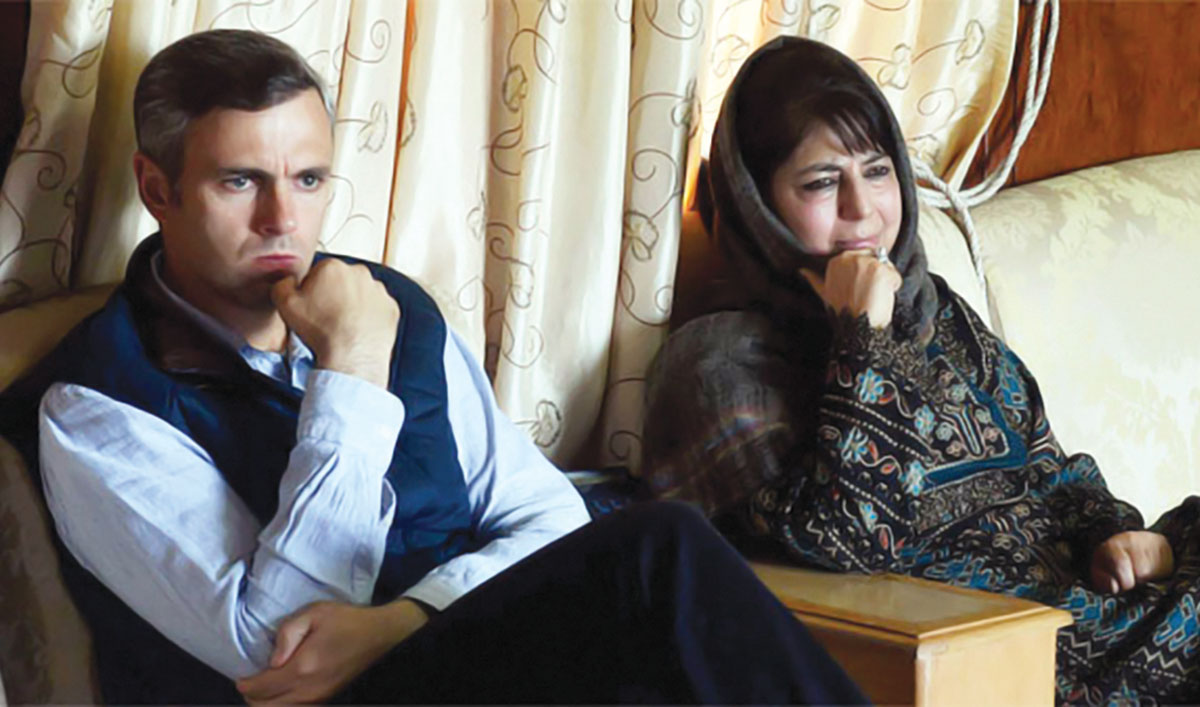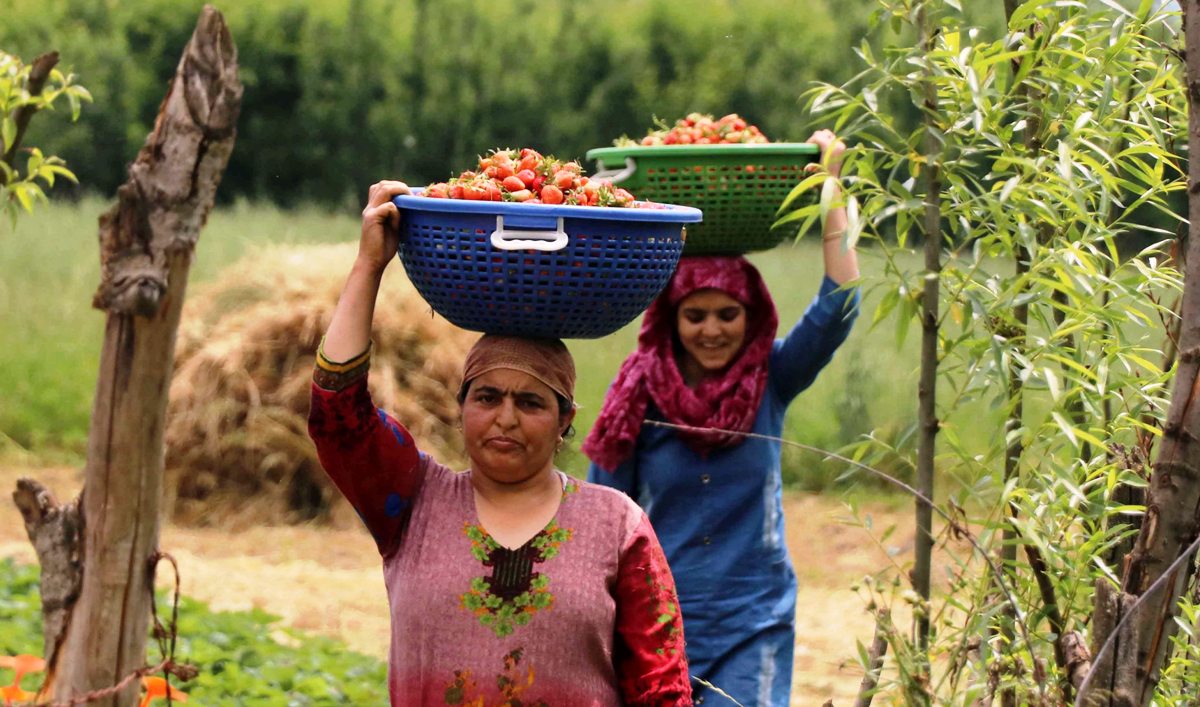In anticipation of JKNC backing a Congress candidate from Leh, Kargil’s all political parties got into a huddle and found a consensus candidate. While Kargil is expected to poll for Haji Hanifa Jan, the Leh vote divides between Congress and BJP. Now the issue is what happens to the Leh-Kargil alliance, asks Syed Shadab Ali Gillani
On May 20, Ladakh will see a great battle for representation and it will be one of the most interesting elections the arid desert has witnessed ever. Initially, it was seen as an electoral battle between the Bharatiya Janata Party (BJP) and the India bloc supported by all non-BJP political parties. As the election fervour intensified, the region’s politics went back to the earlier base – Kargil versus Leh, the two districts that make the assembly-less, federally governed Union Territory.
At the heart of this turbulence lies the National Conference (JKNC), the region’s oldest political party which wields considerable influence across erstwhile Jammu and Kashmir. Initially, the NC-Congress alliance appeared formidable, with a carefully orchestrated division of seats aimed at maximising electoral gains. It was supposed to be a Congress seat with JKNC support, in exchange for Congress supporting JKNC in Kashmir. Recent events, however, have thrown a spanner in the works.
In a surprising turn of events, Kargil, for the time being, came out of its party divisions and converted to a local all-party kind of alliance. After a couple of meetings, it nominated Haji Hanifa Jan, JKNC’s local president, as their consensus candidate. This was aimed at pre-empting the India bloc’s nomination of a Leh candidate for the constituency. This decision sent shockwaves through the political landscape, triggering confusion and strain within both factions.
An erstwhile CEC of LAHDC Kargil, Hanifa lost two council elections in a row. His candidature was accepted by Islamia School, the most powerful religious body that is vital to the region’s politics. Veteran Congress leader, Asgar Karblaie worked overtime in getting Haji the mandate because he wanted the Islamia School should not go with its candidate Sajjad Kargili. After all, that could become a threat to Asgar’s influence. Though Kargili also filed his nomination, he was later convinced to withdraw it.

The decision, however, pushed the region into an age-old rivalry. It has the potential to impact the rare alliance that the two districts have created, based on the common minimum programme for the betterment of the region. Many thought it was a replica of what happened earlier in Kashmir where the JKNC and PDP, despite being the part of India bloc, decided to contest against each other as a result of which their PAGD crumbled.
The repercussions of this discord are palpable. As the NC and Congress grapple with their internal divisions, Ladakh’s regional alliance hangs in the balance. The carefully cultivated partnerships that sustained the region’s tense era since 2020 now face the risk of going the PAGD way.
The NC’s Exodus
Committed to the India bloc, the JKNC was unnerved – or, was it, after its cadres in Kargil went against the party whip. When the party started exerting pressure, the entire party in Kargil announced they had resigned from the party en masse. Qamar Ali Akhoon, the senior party leader from the region, said he sent his resignation to the party leadership in Srinagar, before coming to the press for sharing the decision.
In Srinagar, JKNC Vice President Omar Abdullah expressed dismay at the collective resignation of Ladakh leaders, citing disputes over the joint candidacy of JKNC and Congress. “The collective resignation of NC leaders in Ladakh due to the joint candidature issue is disheartening for me, but our pact with Congress remains steadfast and will not be compromised,” Omar said. “NC is prepared to make sacrifices in this matter.”
After the Kargil backed out, Congress announced Tsering Namgyal, currently serving as the leader of the Opposition in LAHDC, Leh, as its candidate for Ladakh. The decision, endorsed by the India bloc, was announced by veteran Congressman and former minister Rigzin Jora.
“Ladakh, within the India bloc, was designated for the Congress, while Haji is affiliated with NC,” Jora explained. “It is not feasible for Congress to endorse an NC leader, especially within our alliance.” He noted that Hanifa’s nomination was put forward by the “Kargil unit of Congress and NC to exert pressure on the party.”
Tug of War
Now, the situation is increasingly intricate. The JKNC, the region’s oldest party, is in crisis. Akhoon affirmed that they remain steadfast in their support for Haneefa Jan, citing strong backing from the majority of Kargil’s populace. He said the party’s leadership had exerted pressure on them to endorse the Congress candidate from Leh, a demand they could not comply with, given the overwhelming support for their candidate within their district’s Congress unit. Despite uncertainty about the acceptance of their resignations by the party chief, Akhoon noted that their actions were widely known due to media coverage.

A consensus candidate may help Kargil retain the Lok Sabha berth after a long time. The question is: what about the party?
After 2019, the JKNC had to put a long battle from local courts to the Supreme Court to retain the party symbol in the region. The administration was of the view that JKNC does not exist in Ladakh. The battle helped the JKNC retain its status and eventually get – with Congress’s help, the leadership of the LAHDC in Kargil. Now, the Kargil may get the Lok Sabha seat but will that mean the JKNC is out of the region?
Added Tensions
Sajjad Kargili, a prominent figure who represents the Kargil Development Alliance (KDA), lost his 2019 Lok Sabha election because all parties filed their candidates. As the Kargil’s Congress and JKNC joined hands, he also threw his hat in the ring as an independent. Eventually, he was convinced and he withdrew his candidature.
Kargili clarified that the candidate announced by Kargil was not endorsed by KDA but rather by the NC and Congress’s local unit. He said he withdrew his nomination in the broader interest and unity of Kargil, as well as out of respect for his organisation’s intervention and appeal. He explained that his initial resentment stemmed from the lack of full consultation within KDA regarding the nomination, with only the NC and Congress unit of Kargil involved in the decision-making process.
While insisting on the importance of Kargil’s unity over the India bloc issues, Kargili downplayed the JKNC mass resignations, citing similar occurrences in Ladakh’s history. He highlighted the disappointment felt by Kargil’s populace regarding the absence of parliamentary representation, expressing hope that this election cycle may finally bring about change.

At the same time, Kargili criticised the unilateral decision-making process of the JKNC and Congress, emphasising the need for consultation and adherence to the interests of Kargil. He said Haneefa Jan now enjoys widespread support across Kargil, with over 11 organisations within KDA rallying behind him.
Off late, Kargili has been critical of the India bloc. “Ladakh has been fighting for a four-point agenda for the last three years. Sadly, Congress has not clarified its position on statehood for Ladakh, which is not even addressed in its manifesto. Ladakh has been voicing for statehood in all its protests,” he wrote on Twitter recently. “It’s necessary for the government to decide: grant us statehood or contemplate merging Ladakh with J&K again when reinstating statehood to Jammu and Kashmir. With this UT setup, people across Ladakh are not happy.”
This is precisely how Kargil is feeling right now.
The Leh Crisis
In Leh, the BJP is in crisis. In the first major post-2019 move, they decided against fielding the incumbent MP JamyangTsering Namgyal, known for his staunch advocacy for the abrogation of Article 370. It chose Tashi Gyalson, an erstwhile PDP member, who now heads the LAHDC Leh, Ladakh Autonomous Hill Development Council in Leh.
The decision to replace Namgyal with Gyalson marks a significant departure from the convention and underscores the BJP’s calculated approach to electoral politics in Ladakh. Despite Namgyal’s previous success in winning the seat for the BJP in 2019, he was dumped, sparking a dissent. He was convinced and has decided against contesting independently. This unexpected turn of events highlights the BJP’s ability to navigate internal dissent and present a unified front to the electorate. From being the most popular in 2019, BJP is the most disliked in the region.
Interestingly, Gyalson will now fight against Congress’s Tsering Namgyal. Neither of the two Leh candidates has a possibility of getting any from Kargil, Zanskar excluded. Interestingly, Kargil has a consensus candidate who will poll all the votes from the district. So, in Leh, the BJP and Congress will fight each other and their cumulative votes will still be less than that of Kargil.
Official data suggests that Leh has 88877 voters and Kargil 95926, which is more than 7000 more. While Zanskar will cut out a bit of it, the contest is still hugely in favour of Kargil.
Regional Alliance
Will it impact the broader alliance between KDA and Leh’s Ladakh Apex Body (LAB)? The alliance is fighting for regional issues including statehood, assembly, jobs, and Schedule Six.
Chering Dorjay, a member of the LAB believes that despite the electoral fervour, normalcy will soon return. “Elections are temporary, right? Once these phases conclude, both LAB and the KDA will remain intact, and we will resume our work on addressing our demands in the future.”

Besides, Dorjay provides a candid assessment of the BJP’s electoral prospects. “The residents of Leh are not inclined towards the BJP due to unmet demands,” he said. “Their sentiments were overlooked”.
Unlike Leh, Dorjay highlighted the decisive manner in which it chose its candidate. “The people of Kargil have chosen their candidate based on regional interests, weighing what’s best for their area,” he said.
It is interesting to note that the way Kargil behaved in the Lok Sabha is an idea that was generated and successfully practised in Leh for several elections. The people would give up the party affiliations and get into common basic mode for the district’s welfare. This is the first time Kargil copied the model.
Now the situation has reached a stage where the Congress and BJP candidates from Leh have visited Kargil and met the religious leaders. Whether or not it helps them, the fact remains that Kargil is likely to decide on the fate of Ladakh. Congress and BJP are working to woo Buddhist votes in Zansakr and Jan’s team is working in Nubra to get support for him.
With each twist and turn, Ladakh braces for the electoral crescendo as its political narrative continues to evolve, driven by the aspirations and agency of its resilient populace.
However, the campaign of Kargil’s Haji and Leh’s Tsering Namgyal is neither communal nor regional. They are talking about the same set of issues that the alliance was talking about- state status, assembly, sixth schedule, jobs and other things. That essentially makes it a perfect copy of Kashmir where PDP and NC fight each other but are civil and talk about the same issues.
Post Script
The last-minute reports from Kargil suggest that Haji is unlikely to have all the votes from Kargil despite being a consensus candidate. A huge section of the Congress is still polling for the official Congress candidate and BJP is also supposed to get a bit of its influence in the EVMs on May 20. “We can safely say almost 15000 to 20,000 votes in Kargil can have an impact,” one informed resident suggested. “He is unlikely to get too many votes from Leh. His wife is a Leh Arguan and may poll some votes but not much.”















